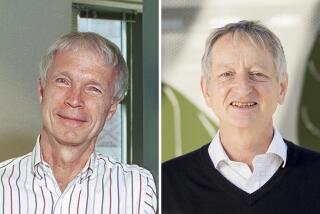Three Americans Share in Nobel Science Prizes : Awards: The detection of quarks and a method of lab analysis are honored in physics and chemistry.
- Share via
STOCKHOLM — Two American physicists and a Canadian who first detected the universe’s tiniest known particles--quarks--and an American chemist who re-creates natural substances in the lab were honored today with 1990’s final Nobel Prizes.
Jerome I. Friedman and Henry W. Kendall of the Massachusetts Institute of Technology and Canadian Richard E. Taylor of Stanford University will share the $700,000 Nobel Prize in physics.
“Their discoveries are a breakthrough in our understanding of the structure of matter,” the Royal Swedish Academy of Science said in its award citation.
“I’m totally overwhelmed, surprised and very honored--all those types of things,” Friedman, 60, said by telephone from Ft. Worth, where he was attending a symposium. “I never really thought of that as a real possibility.”
Kendall, 64, said in a telephone interview from Cambridge, Mass., that he was “overwhelmed” and had not expected to win.
“Numb, I guess, is the closest word,” said Taylor, 60, by telephone from his home on the Stanford campus near Palo Alto. “I certainly didn’t expect it. It will probably hit me in a day or two.”
The $700,000 Nobel in chemistry went to Elias James Corey, 62, of Harvard University, for his work advancing the theory and methodology of organic synthesis.
Corey in the 1960s developed “retrosynthetic analysis,” a method of breaking down a natural molecule into its component parts to determine how it can be reassembled in the lab.
“In this way, less complicated building blocks were obtained which could later be assembled in the process of synthesis,” the academy said in its award citation.
In particular, it said, Corey’s achievement was to show how his method lent itself easily to computer programming, starting a process of computer synthetic planning that is “developing rapidly.”
The three physicists were cited for research more than 20 years ago that led to an explosion of understanding of the most fundamental nature of matter.
Their work confirmed the existence of quarks, the building blocks used to form neutrons and protons. Those particles, in turn, make up the bulk of the atom, the building block of the molecule, the basis of all matter.
Friedman, Kendall and Corey are the sixth, seventh and eighth Americans to win 1990 Nobel prizes. Taylor is the first Canadian to win the physics prize.
The 1990 awards, now all announced, will be presented to the laureates on Dec. 10, the anniversary of the death of Alfred Nobel, the Swedish inventor of dynamite who created the prizes in his 1895 will.
More to Read
Sign up for Essential California
The most important California stories and recommendations in your inbox every morning.
You may occasionally receive promotional content from the Los Angeles Times.










